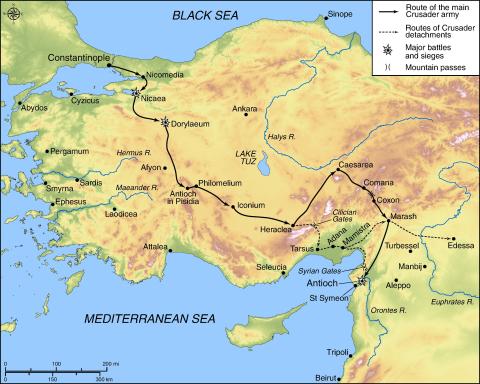The Road to Antioch
[4.11.1] Maior vērō exercitus, scīlicet Raimundus comes dē Sānctō Egidīō, et doctissimus Boamundus, duxque Godefridus, et aliī plūrēs, in Armeniōrum intrāvērunt terram, sitientēs atque aestuantēs Turcōrum sanguinem. Tandem pervēnērunt ad quoddam castrum, quod tam forte erat, ut nihil eī possent facere. Erat autem ibi homō quīdam nōmine Symeon, quī in illā ortus fuit regiōne, quīque hanc petiit terram, quō eam dē manibus dēfenderet inimīcōrum Turcōrum; cui sponte illī dedērunt terram, quīque remānsit ibi cum suā gente. Nōs dēnique exeuntēs inde pervēnimus fēlīciter, usque Caesaream Cappadociae.
[4.11.2] Ā Cappadociā autem ēgressī, vēnimus ad quandam cīvitātem pulcherrimam et nimis ūberrimam, quam paululum ante nostrum adventum obsēderant Turcī per trēs hebdomadas, sed nōn superāverant. Mox illūc advenientibus nōbīs, continuō trādidit sē in manū nostrā, cum magnā laetitiā. Hanc igitur petiit quīdam mīles, cui nōmen Petrus dē Alpibus, ab omnibus seniōribus, quātinus eam dēfenderet in fidēlitāte Deī et Sānctī Sepulchrī, et seniōrum atque imperātōris. Cui cum nimiō amōre gratis concessērunt eam.
notes
vocabulary
4.11.1
sitiō sitīre: to thirst for
aestuō (1): to burn for
fēlīciter: successfully, with good results (OLD 2)
4.11.2
quātinus: how far; how (CL); that (ML)
gratis: for no reward, for nothing (OLD gratia 8)

